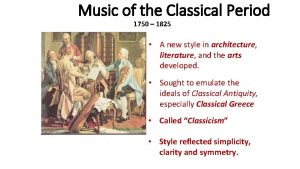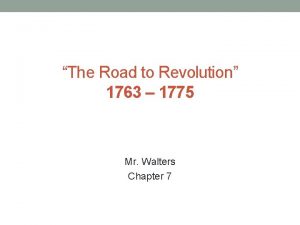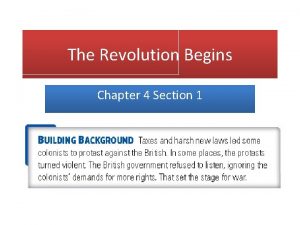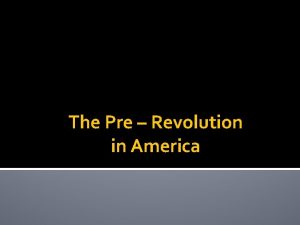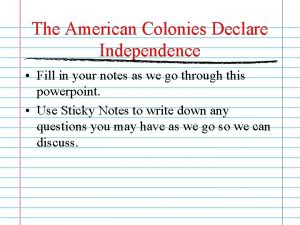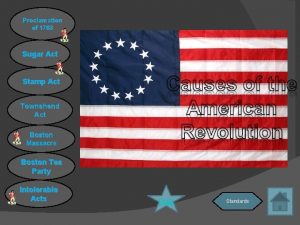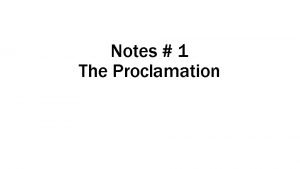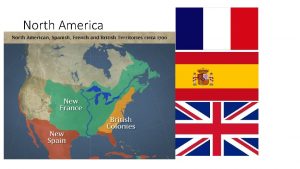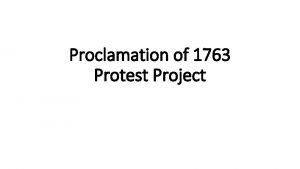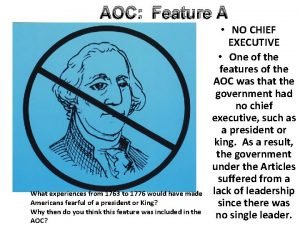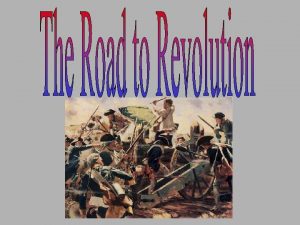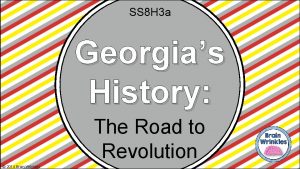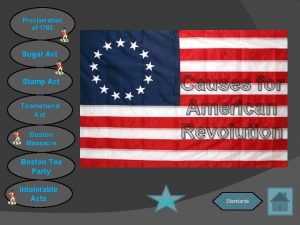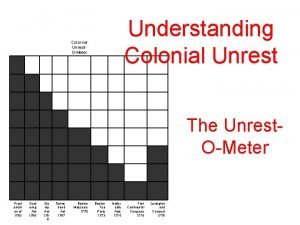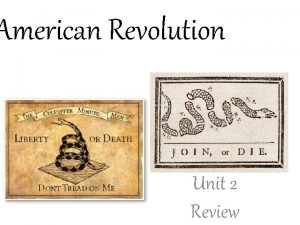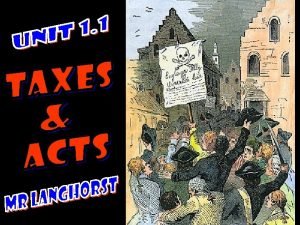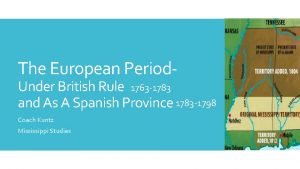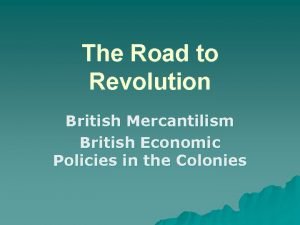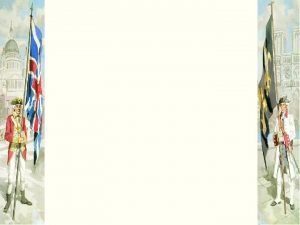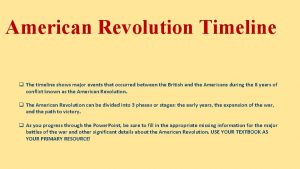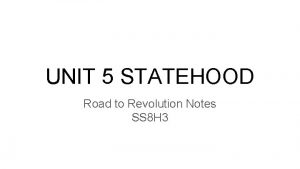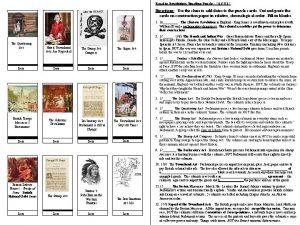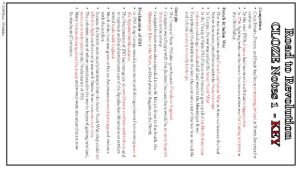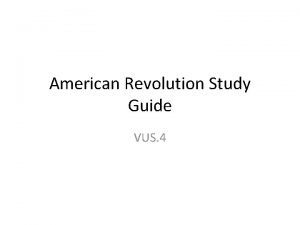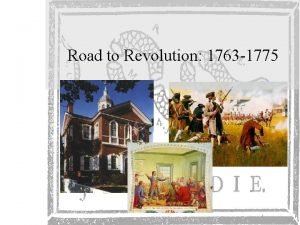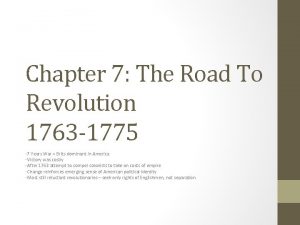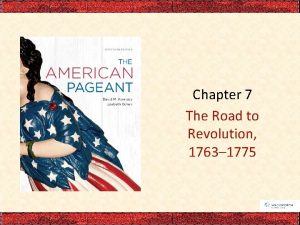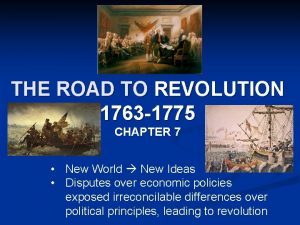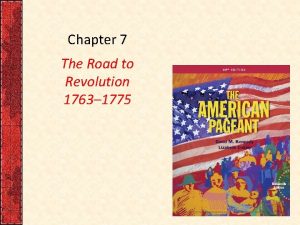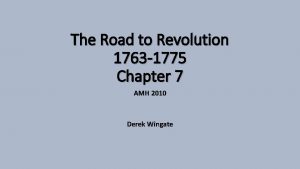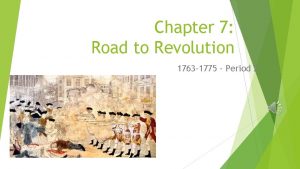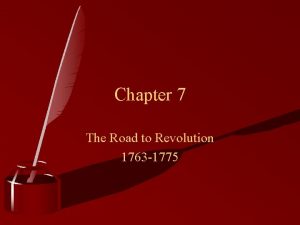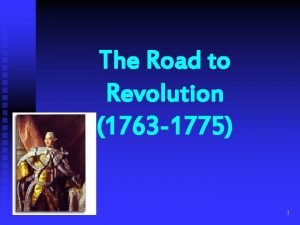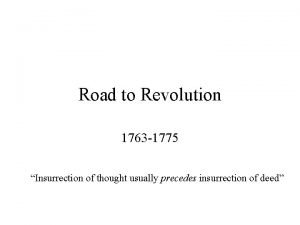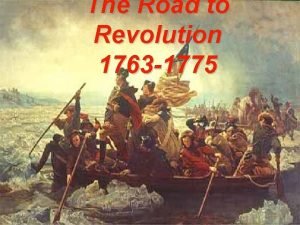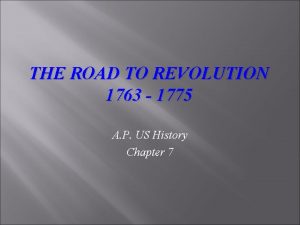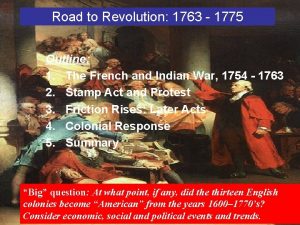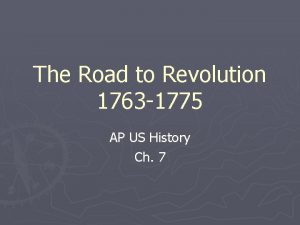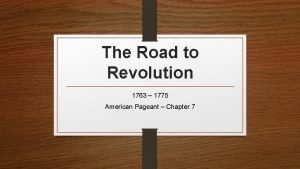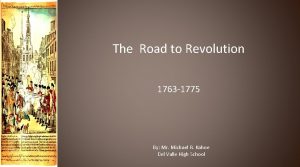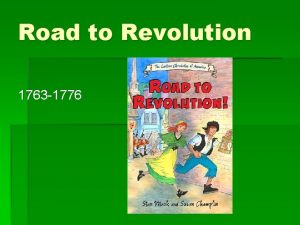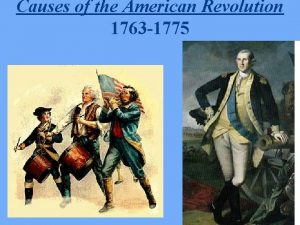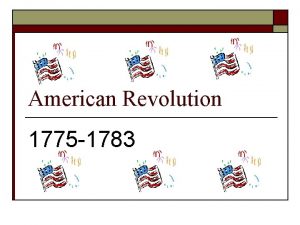Chapter 7 The Road to Revolution 1763 1775


































- Slides: 34

Chapter 7 The Road to Revolution (1763 -1775)

1650 First Navigation Laws to control colonial commerce 1770 Boston Massacre 1763 Seven Years’ War (French and Indian War) 1772 Committees of correspondence formed 1764 Sugar Act 1773 British East India Company granted tea monopoly. Governor Hutchinson’s actions provoke Boston Tea Party. 1765 Quartering Act. Stamp Act Congress. 1774 “Intolerable Acts” Quebec Act First Continental Congress The Association boycotts British goods. 1766 Declaratory Act 1775 Battles of Lexington and Concord. 1767 Townshend Acts. New York legislature suspended by Parliament. 1768 British troops occupy Boston

Victory of the Seven Years’ War • Made Great Britain a large imperial power in North America • The War in North America was very expensive – Colonists didn’t want to pay their part – Led to more tension between the two, especially with America and its new political identity • Reluctant Revolution- Shared military, commercial, and cultural bonds – Wanted “rights of Englishmen” • Politics and economics led to Revolution

I. The Deep Roots of Revolution • Republicanism- Inspired by Greeks and Romans. – All citizens gave up personal, selfish needs for common good • Whigs- Feared threat to liberty – Patronage

II. Mercantilism and Colonial Grievances • Empire required in “fit of absentmindedness” • Mercantilism- Wealth measured by gold and silver • Colonists were looked at as tenants • Navigation Law of 1650 – Enumerated products • Currency Shortage and Paper Money

III. The Merits and Menace of Mercantilism Navigation Laws John Hancock Monopoly Burdens Stifled economic initiative Imposed dependency on British agents and creditors Feelings of being used “…Britain failed to recognize an emerging nation when it saw one. ”- Theodore Roosevelt

IV. The Stamp Tax Uproar • Great Britain was a big empire with big debt – 140 million pounds or $213, 498, 600 • Prime Minister George Grenville – Sugar Act of 1764 – Quartering Act of 1765 – Admiralty Courts – “No taxation without representation” – Legislation vs. taxation • Virtual Representation



V. Parliament Forced to Repeal the Stamp Act • Stamp Act Congress of 1765 – 27 delegates from 9 colonies petitioned the king and Parliament to repeal the Stamp Act • Helped colonial unity – Nonimportation agreements • Boycotts • Use of domestic products • United the American people for the first time in a common action – Colonial Protests (men AND women)


V. Parliament Forced to Repeal the Stamp Act Cont. • Sons and Daughters of Liberty – “Liberty, Property, and No Stamps” – Violent tar and featherings for those that didn’t partake in the boycotts – Ransacked officials’ houses – Hanged effigies of stamp agents on liberty poles • Stamp agents resigned – No one to sell stamps – Law nullified

V. Parliament Forced to Repeal the Stamp Act Cont. • Britain was hit hard by EVERYTHING – Merchants, manufacturers, laborers and shippers suffered from the boycotts and nonimportation agreements • Parliament at a loss – Britons shouldn't have to pay heavy taxes to protect the colonies – Colonists didn’t want to pay 1/3 of the cost of their own defense • 1766: Parliament repealed the Stamp Act , but passed the Declaratory Act

VI. The Townshend Tea Tax and the Boston “Massacre” • Charles “Champagne Charley” Townshend – Head of British Ministry • Townshend Acts (1767) – Light import duty on glass, white lead, paper, paint, and tea • Indirect customs duty payable at American Ports – Colonists most angry about the tea tax – Would be used to pay salary of royal governors and judges in America • Colonists very angry about this

VI. The Townshend Tea Tax and the Boston “Massacre” Cont. • London government suspended the New York Legislature in 1767 – Failure to comply with the Quartering Act • Tried nonimportation agreements again – Less effective because they took the taxes less serious than the Stamp Act because they were light and indirect • Smuggled tea

VI. The Townshend Tea Tax and the Boston “Massacre” Cont. • British officials sent two regiments of troops to Boston in 1768 to regain order – Colonists taunted the redcoats • March 5, 1770 – The Boston Massacre • Crispus Attucks



VII. The Seditious Committees of Correspondence • 1770 - King George III wanted to assert the power of the British monarchy – Lord North and the “yes men” • Townshend Acts – Failed to produce revenue – Nonimportation agreements started working – Finally repealed by Lord North, but kept the 3 pence tax on tea


VII. The Seditious Committees of Correspondence Cont. • Samuel Adams – Propaganda Master – Helped organize the local committees of correspondence in Massachusetts • Spread the spirit of resistance by exchanging letters • Intercolonial Committees of Correspondence – Virginia created the first one in 1773 – Exchanged ideas and information with other colonies – Evolved into the first American Congresses

VIII. Tea Parties at Boston and Elsewhere • British East India Company – Facing bankruptcy in 1773 • London would lose huge tax revenues • Ministry decided to give it complete monopoly of the American tea business • Allowed it to sell tea cheaper than ever before • Americans saw this as a way of them having to swallow up the tea tax • Colonial resistance to East Indian tea – Not one chest of tea made its way into America – Philadelphia and New York held demonstrations

VIII. Tea Parties at Boston and Elsewhere Cont. • “Liberty and Independence of Death in Pursuit of It!” – Marylanders at Annapolis while burning both the cargo and vessel of tea sent to the colonies – Symbol of colonial resentment of the British • Thomas Hutchinson – Agreed tea tax was unjust, but didn’t believe colonists had the right to go against the law – An “abridgement of what are called English liberties” was necessary to bring law and order back to the British colonies

VIII. Tea Parties at Boston and Elsewhere Cont. • December 16, 1773: The Boston Tea Party – About 100 Bostonians dressed as Indians boarded the docked ships, smashed open 342 tea chests and dumped them into the Atlantic • “The hated badge of slavery. ” – Tea tax resembled slavery to the colonists


IX. Parliament Passes the “Intolerable Acts” • Boston Port Act – Closed the Boston Harbor until damages were paid and order could be ensured in Boston • Intolerable Acts – American term for acts passed by Parliament to punish Boston and the whole of Massachusetts • New Quartering Act – Local authorities had power to lodge British soldiers in private homes

IX. Parliament Passes the “Intolerable Acts” Cont. • Quebec Act – French Canadians were guaranteed Catholicism – Permitted to retain old customs and institutions – Not required to have a representative assembly or trial by jury in civil cases – Alarmed anti-Catholics

X. The Continental Congress and Bloodshed • First Continental Congress – Summer of 1774 – All 13 colonies except Georgia sent wellrespected delegates – Met in Philadelphia from September 5 to October 26 – John Adams played a large role • Swayed his colleagues to a revolutionary course • Defeated a proposal for American home rule under British direction

X. The Continental Congress and Bloodshed Cont. • The Association – Created by the First Continental Congress – Called from complete boycott of all British goods • Nonimportation • Nonexportation • Nonconsumption – Violators tarred and feathered • April 1775: British commander in Boston sent troops to Lexington and Concord – Wanted to seize colonial gunpowder and rebel leaders

X. The Continental Congress and Bloodshed Cont. • “Minute Men” – At Lexington, refused to disperse quickly and British troops opened fire • Killed 8 Americans and wounded several – British pushed on Concord, but they were forced to retreat by those ready to fight

XI. Imperial and Colonial Strengths and Weaknesses Imperial Britain’s Strength and Weaknesses • British Strengths – Population – Money – Naval Power • British Weaknesses – Troops had to be detached – France – King George III and Lord North – Whigs

XI. Imperial and Colonial Strengths and Weaknesses Cont. • British Army in America • Strengths: – 50, 000 – German Soldiers – 50, 000 American Loyalists and Indians • Weaknesses: • Generals in America were second rate • Soldiers treated poorly • Provisions scarce, rancid, and wormy • Redcoats had to conquer the Americans • 3, 000 miles from home base • Delayed Military Orders

XI. Imperial and Colonial Strengths and Weaknesses Cont. • American Strengths: • Weaknesses: – No main city – Huge expanse of land – George Washington – Aid from France – Home Court Advantage – Self-sustaining agriculture – Fought for a cause – Not organized for war – No shared, written constitution – Inflation

XII. A Thin Line of Heroes • American Military Supplies • Manufactured Goods • American Militiamen – Baron von Steuben – Blacks • Lord Dunmore • “Black Loyalists” • American Profiteers – Lack of effective zeal for the cause
 1750 music
1750 music Stipta
Stipta 1775-mr4
1775-mr4 Battle of lexington and concord winner
Battle of lexington and concord winner Valentin ross forensic science
Valentin ross forensic science Chapter 4 section 1 the revolution begins
Chapter 4 section 1 the revolution begins Peter zenger american revolution
Peter zenger american revolution May 1775
May 1775 May 1775
May 1775 What is paved and unpaved road
What is paved and unpaved road Proclamation of 1763 picture
Proclamation of 1763 picture What did the proclamation of 1763 forbid
What did the proclamation of 1763 forbid Proclamation of 1763
Proclamation of 1763 Pinckney's treaty
Pinckney's treaty Ohio river valley 1763
Ohio river valley 1763 Proclamation of 1763 protest
Proclamation of 1763 protest What experiences from 1763 to 1776
What experiences from 1763 to 1776 Proclamation of 1763
Proclamation of 1763 Proclamation of 1763 caricatures
Proclamation of 1763 caricatures Proclamation of 1763
Proclamation of 1763 First nations attack fort michilimackinac
First nations attack fort michilimackinac Thomas barnard sermon massachusetts 1763
Thomas barnard sermon massachusetts 1763 Colonial unrest-o-meter
Colonial unrest-o-meter Proclamation of 1763
Proclamation of 1763 Proclamation of 1763
Proclamation of 1763 Why did the colonists hate the townshend acts
Why did the colonists hate the townshend acts Under british rule, 1763-1783
Under british rule, 1763-1783 Navigation acts 1763
Navigation acts 1763 Map of north america 1763
Map of north america 1763 Road to american revolution timeline
Road to american revolution timeline Road to revolution cloze notes 1
Road to revolution cloze notes 1 Road to revolution timeline answers
Road to revolution timeline answers Road to revolution cloze notes 1
Road to revolution cloze notes 1 Road to revolution study guide answer key
Road to revolution study guide answer key Russian revolution vs french revolution
Russian revolution vs french revolution
